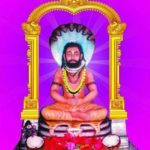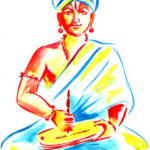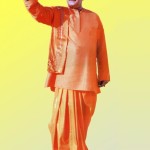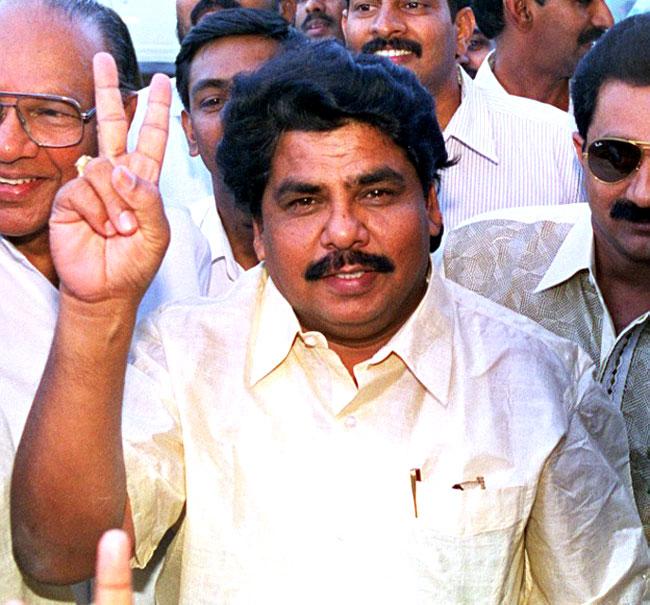
Taking a break from Ancient History, ACP moves on to a modern Personality. The History of Modern Aandhra politics is often controversial and acrimonious. Some political figures, however, find a way to rise above the rucus despite their coming from humble origins. One such figure is periodically mentioned, but all-too-rarely memorialised: GMC Balayogi.
Background
Ganti Mohana Chandra Balayogi was born in Yedurulanka village to Sri Ganniyya and Smt. Satyamma, of agricultural background. They were from East Godavari District in Konaseema. He completed his primary education at Guttana Divi and college at Kakinada before finally finishing at Andhra University, Waltair. With a post-grad in Political Science as well as a law degree, he practiced the legal profession at Kakinada in 1980, under Gopalaswamy Shetty. He became a 1st class Magistrate in 1985.[7]
He was elected to the 10th Lok Sabha in 1991, on a TDP ticket. Having cut his teeth in politics as a 1st time MP, he met with a reversal in 1996. His political defeat was only temporary and he would bounce back in an MLA by-election for Andhra Pradesh. Finally, he would return to the Lok Sabha, but in an even more important capacity. [7]
“The Telugu Desam Party (TDP) to which he belonged had agreed to extend support from outside to the Bharatiya Janata Party-led coalition that had emerged as the largest component of the newly constituted Lok Sabha. But there was a condition – that its nominee should be elected Speaker. Amidst speculation in which a number of contenders figured, Balayogi, the dark horse, emerged on top. ” [5]
His Speakership was characterised by his quiet dignity and commitment to impartiality. This might seem unheard of in today’s partisan times, but it was emblematic of a better era with a worse economy. Parliamentary behaviour was actually a thing, and the concept of patriotic dissent and constructive criticism existed. Sure there was corruption and petty politics, but politicians had to at least make pretence to protecting the national interest. This is unlike today, where the Leader of the Opposition proudly proclaims he is “fighting the Indian state“.
Mummidivaram was Balayogi gaaru’s home town. He would pass away in Bhimavaram.
Balayogi had travelled to Bhimavaram in coastal Andhra Pradesh on Saturday to participate in the Millenium Peace Festival organised by evangelist K.A. Paul of Global Peace initiative. Mike Huckabee, governor of the US state of Arkansas. was present at the festival.”
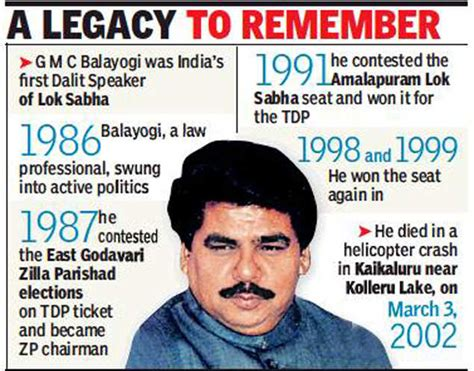
Though there was no immediate suspicion of foul play, Helicopter crashes are known methods of assassination of important political figures: Former Chief Minister YSR being one, and Former Mahasenadi Bipin Rawat ji being another. If so, it only cements the desh-anurakth credentials of the impartial Indian Speaker of the House: GMC Balayogi. Despite coming from Scheduled Caste Background and practicing the religion of love, in the mould of George Fernandes, he visibly defended national interest.
“The helicopter carrying the Speaker, his gunman and an assistant developed a technical snag after it took off from Bhimavaram at 7:45 am.
His additional Private Secretary K S Raju and the pilot of the chopper also died in the accident.” [4]
“The private helicopter in which Balayogi was travelling from Bhimavaram in West Godavari district crashed in a fishpond near Kaikalur in Krishna district. ” [6]
The man who was born in 1 Godavari district would pass away in the other. He would dedicate his life to the GoJi’s, unlike many Telugu youth today who are filled only with Gajji. He is an example of a better man in a more difficult time, and an example to the next generation.
Achievements
The First Dalit Speaker of the Indian Lok Sabha would naturally have a pioneering place in the history of the Republic of India. However, Balayogi gaaru’s elevation represented not just one but 2 firsts. He was the first Speaker elected from a Regional party.
“In just over three years as Speaker, he had earned a reputation for efficient, calm and dignified conduct even in trying circumstances.” [5]
This was particularly significant during the 2001 Parliament attack & 2002 Gujarat Riots.
“The litmus test Balayogi faced in Lok Sabha was when, he, a second time MP was made speaker in 1998 and Vajpayee-led NDA government was voted out by a single vote of Giridhar Gomang.
“It was a very tough situation and a delicate matter to deal with as legal luminaries and senior members were reading out legal provisions whether or not to allow a Chief Minister of a state, who did not resign from the Lok Sabha to vote”, Balayogi had said and added “and I knew the decision I had to take would have a bearing on the Parliamentary history of the country”. [5]
Despite coming from an agricultural family, he would earn a bachelor’s and post-graduate degree. After all, merit is not merely credentials or exams, but weighing where an individual begins and where his career ends. More than that, it is the proven record to give back to the society in which one was born and raised.
“His initiative and endeavour in reaching the sufferers of the ‘blow out’ incident at Fasarlapudi in 1995 and the victims of cyclonic tragedy in Konaseema in 1996 were not forgotten by the people. ” [3]
He leaves behind a family legacy and political legacy as well.
“Survived by his wife, a son and three daughters, Balayogi devoted time to his Amalapuram constituency and played a significant role to help farmers in getting compensation from the ONGC when there was a blow-out in oil well in the 1990s.” [3]
His son Harish is active today in Andhra Pradesh politics and on the national stage as MP of Amalapuram.
Legacy

As custodians of parliamentary decorum and guardians of democratic principles, the legacy of Lok Sabha Speakers resonates through the chronicles of Indian democracy, serving as a testament to the enduring strength and resilience of the nation’s democratic institutions. As custodians of parliamentary decorum and guardians of democratic principles, the legacy of Lok Sabha Speakers resonates”
It is the belief of many a politician and political observer that GMC Balayogi upheld precisely these principles of not only the Speakership of the Lok Sabha, but of Parliamentarism itself. The notion that there is to be an august temperance in the conduct of the public business has long ago escaped today’s soundbite media “journalists” (if we can even call them that…). This has coerced MP’s, MLA’s and MLC’s of all stripes to follow suit, and raise the decibel level both outside and inside the governance chambers. This needs to change. Indeed, this prominent political personality himself attempted to do so.
“Balayogi made efforts to restore normalcy in Parliament even on his last day in Lok Sabha on Friday, February 28, when angry members created an uproar over the Gujarat violence, forcing him to adjourn the House. He was instrumental in convening, last November, the All-India Conference of Presiding Officers and Political Parties, where an unprecedented code of conduct was adopted in the Central Hall of Parliament, advocating temporary ostracism as a punitive measure for “grave misconduct”. For the first time in the 50-year history of the Lok Sabha, rules of procedures were amended to provide for the automatic suspension of a member who entered the well of the House to disrupt proceedings. ” [3]
Dignified conduct and codes of behaviour are all too rare not only for the modern Indian politician, but for the Modern Indian himself. Alas, figures like Speaker Balayogi are rare themselves. They come all of a sudden and pass away all too quickly. He is remembered vividly today not only by Telugu Desam Acolytes, but by Indians of all stripes whether in the Parliament House or at GMC Athletic Stadium in Hyderabad.
Ganti Mohana Chandra Balayogi was handpicked by Telugu Desam Party (TDP) supremo N. Chandrababu Naidu in 1998 to become the youngest and first Dalit Speaker of the Lok Sabha.
His popularity was evident when after his untimely death in an air-crash on March 3, his body did a full circuit through Vijayawada to Hyderabad to Delhi so that people could pay homage before it was taken back to his constituency since 1991, Amalapuram, for the final rites three days later.”
Such universal praise for a politician today is truly rare. At a time when Bhaarath is beset by braggarts and boorish bravado, Balayogi gaaru was known for his demure dignity & integrity.
“He conducted proceedings impartially during the confidence vote on the Vajpayee government in 1999.
The lawyer from Kakinada who quit his “secure government job” as a first class magistrate to join the TDP in 1982 had come a long way. Balayogi was too modest to speak about his origins and meteoric rise.”
References:
- https://speakerloksabha.nic.in/former/baalyogi.asp
- https://www.thehindu.com/todays-paper/tp-national/tp-tamilnadu/landslide-win-for-tdp-candidate/article27850455.ece
- “The Gentle Speaker “. OutlookIndia. https://web.archive.org/web/20121002234942/http://www.outlookindia.com/article.aspx?214753
- “HT This Day: March 04, 2002 — Balayogi dies in crash”.Hindustan Times. 2002
- The Speaker from Amalapuram. TH. 2002
- “Lok Sabha Speaker G MC Balayogi dies in helicopter crash”. Rediff. 2002
- “GMC Balayogi: India’s First Dalit Speaker”. TOI. 2002
